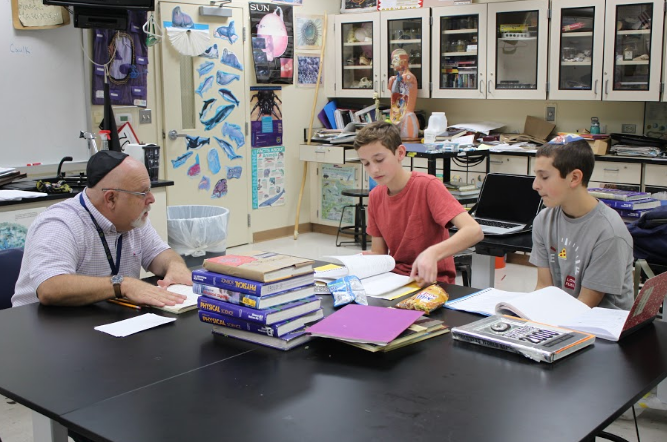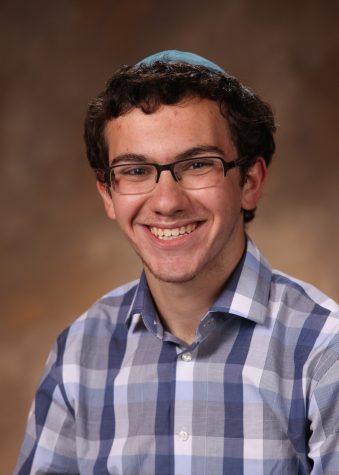It’s all Greek to me: Language club adapts to new schedule
Science teacher Nick Miller teaches freshmen Jonah Abrams and Austin Kaminow a lesson during Greek club on Nov. 9, 2016. Abrams and Kaminow were the only two students present for the session, which covered the use of the Aorist tense.
November 28, 2016
Down the science corridor lies a classroom that on Wednesday afternoons is the site of curiosity at work. Under the guidance of science teacher Nick Miller, four freshmen learn how to read and speak classical Greek.
For many years, Miller taught a club for middle-schoolers and high-schoolers about classical Greek: the language of Athens around the time of Socrates and Plato in the fifth and fourth centuries B.C.E. When the club period was cancelled before the 2016-17 school year, most of the group’s members dropped Greek, but a few current freshmen were still eager to learn.
The freshmen and Miller decided that they wanted to keep learning together. Miller, who places large value on a classical Greek education, and the students decided to meet after school on Wednesdays. Miller began learning Greek in college while he was studying biology, and he has been fascinated ever since.
“Our drama, democracy, athletics, architecture, music, when you study geometry, it’s basically a translation of Euclid: all that comes from the Greeks,” Miller said. “So to really understand the roots of our culture and why it’s so powerful, you have to understand the Greeks.”
One key difference between the after-school club and the old club that occurred during the school day is the length of each session. The weekly classes now last 45 minutes, which Miller said is a “night and day” improvement from the previous half-hour classes, since he gets time to teach both vocabulary and grammar.
Each class, Miller tries to teach a section of vocabulary and a section of grammar, both of which he gets from “A First Greek Book” by C.T. Ruddick Jr. The students learn to read Greek sentences, pronounce letters and words correctly and translate between English and Greek. The translation can be difficult as the structures of Greek and English are different, but Miller said that the students pick it up “well.”
Freshman Russell Lubin has enjoyed studying Greek since he first joined the club in seventh grade. That year, Lubin also had Miller as his Life Science teacher. Miller taught as much Greek as he could, including Greek root words and how to pronounce them. Seeing the same value in Greek that Miller does, Lubin joined the after-school club, and he said that there are many benefits of the new arrangement over the old club.
“It’s able to be a lot more focused because we have as much time as we want to,” Lubin said. “There’s also a lot less people because only the people who are really committed go to it because it’s an after-school activity and it’s not just something you can do whenever.”
Lubin said that one problem with the old club was that each year, the club would accept new members who had no Greek knowledge, which forced the group’s curriculum to restart every year. In his efforts to try and cater to all of his students, Miller tried to have the more experienced students, like Lubin, teach their younger classmates, but he still found the older kids to be “bored.” Miller decided to make the after-school club exclusively for returning students and created a Hug on Fridays for new students.
Freshman Jonah Abrams is another student in the Greek club. For Abrams, learning Greek was not the only attraction to the club. Miller, who Abrams said “genuinely likes to teach” was also a major draw.
“I knew nothing about Greek pretty much all my life,” Abrams said. “Then I went to Mr. Miller’s class in seventh grade, and we learned science but he also taught so much more, including different fun facts and also Greek roots and that pretty much gave me the initiative to join the Greek club and just learn from Mr. Miller. A lot of it is Greek, but a lot of it is also Mr. Miller.”
For Miller, the feeling is reciprocated, and the students make his commitment worthwhile.
“The kids that are doing it, they’re sharp,” Miller said. “They’re picking it up and they’re passionate about it.”








